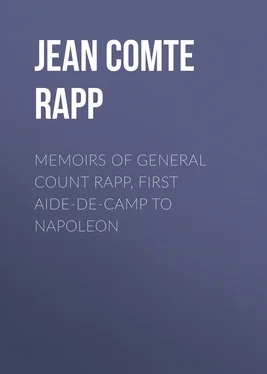Jean Comte Rapp - Memoirs of General Count Rapp, First aide-de-camp to Napoleon
Здесь есть возможность читать онлайн «Jean Comte Rapp - Memoirs of General Count Rapp, First aide-de-camp to Napoleon» — ознакомительный отрывок электронной книги совершенно бесплатно, а после прочтения отрывка купить полную версию. В некоторых случаях можно слушать аудио, скачать через торрент в формате fb2 и присутствует краткое содержание. Жанр: Биографии и Мемуары, История, foreign_edu, foreign_antique, foreign_prose, на английском языке. Описание произведения, (предисловие) а так же отзывы посетителей доступны на портале библиотеки ЛибКат.
- Название:Memoirs of General Count Rapp, First aide-de-camp to Napoleon
- Автор:
- Жанр:
- Год:неизвестен
- ISBN:нет данных
- Рейтинг книги:5 / 5. Голосов: 1
-
Избранное:Добавить в избранное
- Отзывы:
-
Ваша оценка:
- 100
- 1
- 2
- 3
- 4
- 5
Memoirs of General Count Rapp, First aide-de-camp to Napoleon: краткое содержание, описание и аннотация
Предлагаем к чтению аннотацию, описание, краткое содержание или предисловие (зависит от того, что написал сам автор книги «Memoirs of General Count Rapp, First aide-de-camp to Napoleon»). Если вы не нашли необходимую информацию о книге — напишите в комментариях, мы постараемся отыскать её.
Memoirs of General Count Rapp, First aide-de-camp to Napoleon — читать онлайн ознакомительный отрывок
Ниже представлен текст книги, разбитый по страницам. Система сохранения места последней прочитанной страницы, позволяет с удобством читать онлайн бесплатно книгу «Memoirs of General Count Rapp, First aide-de-camp to Napoleon», без необходимости каждый раз заново искать на чём Вы остановились. Поставьте закладку, и сможете в любой момент перейти на страницу, на которой закончили чтение.
Интервал:
Закладка:
"You will cut, that is to say, intercept, as early as possible, the navigation of the Spree by a strong party, so as to stop all the boats that may attempt to proceed from Berlin to the Oder.
"To-morrow our head-quarters will be at Potsdam. Send one of your aides-de-camp to inform me where you may be on the nights of the 23d and 24th.
"If Prince Ferdinand should be in Berlin, present your compliments to him, and give him a guard, with entire freedom from quartering.
"Publish immediately the order for disarming the troops in Berlin, leaving only 600 militia for the police-duty of the city. The arms of the citizens must be conveyed to some place that may be determined on, to be at the disposal of our army.
"Make known to your corps that the Emperor, in directing it to be the first to enter Berlin, gives a proof of his satisfaction of the excellent conduct of the troops at the battle of Jena.
"Be careful to direct that all the baggage, and particularly that which is in bad condition, shall halt at the distance of two leagues from Berlin, and rejoin the camp, without passing through the capital, but by proceeding along another road on the right. Finally, make your entrance into Berlin in the best possible order, and by divisions, each division having its artillery, and marching at the interval of an hour after each other.
"The camp being formed, give orders that the troops proceed to the city only by thirds, so that there may be always two-thirds at the camp. As his Majesty expects to make his entrance into Berlin, you may provisionally receive the keys of the city, informing the magistrates that they must nevertheless deliver them up to the Emperor on his arrival. You must require the magistrates and persons of distinction to receive you at the gates of the city, in all due form; and direct your officers to make the best appearance that circumstances will permit. The Emperor proposes that you shall make your entrance by the high road of Dresden.
"The Emperor will probably take up his abode in the palace of Charlottemburgh. Give orders that every thing may be prepared for his reception.
"There is a little rivulet which falls into the Spree, at the distance of a league and a half or two leagues from Berlin, and which intersects the road leading to En."
CHAPTER XIII
We set out for Potsdam; and we were overtaken by a storm: it was so violent and the rain fell in such torrents, that we took refuge in a neighbouring house. Napoleon was wrapped in his grey military great coat, and, on entering the house, he was much astonished to see a young female, who seemed to be much agitated by his presence. She proved to be a native of Egypt, and she evinced for Napoleon all the religious veneration which he had been accustomed to receive from the Arabs. She was the widow of an officer of the army of the East; and fate had conducted her to Saxony, and to the very house in which the Emperor was now received. Napoleon granted her a pension of 1200 francs, and undertook to provide for the education of her son, who was the only dowry her husband had left her. "This," said Napoleon, "is the first time I ever took shelter against a storm. I felt a presentiment that a good action awaited me."
We found Potsdam uninjured. The Court had even fled so precipitately that nothing had been removed. Frederick the Great's sword and belt, and the cordon of his orders, all were left. Napoleon took possession of them. "I prefer these trophies," said he with enthusiasm, "to all the King of Prussia's treasures. I will send them to my veterans who served in the campaign of Hanover. I will present them to the governor of the Hospital of Invalids, by whom they will be preserved as a testimony of the victories of the great army, and the revenge it has taken for the disasters of Rosbach."
No sooner had we entered Potsdam than we were besieged by deputations; they came from Saxony, from Weimar, and from all quarters. Napoleon received them with the utmost affability. The envoy of the Duke of Brunswick, who recommended his subjects to the generosity of the French, was, however, received less courteously than the rest. "If," said Napoleon to the person who presented the deputation, "I were to demolish the city of Brunswick, if I were to leave not a stone of the walls standing, what would your Prince think of me? And yet would not the law of retaliation authorize me to do in Brunswick what the Duke would have done in my capital? To announce the design of destroying cities may be the act of a madman; but to attempt to sully the honour of a whole army of brave troops, to wish to mark out a course for us to quit Germany merely on the summons of the Prussian army, is a fact which posterity will with difficulty credit. The Duke ought not to have attempted such an outrage. When a general has grown grey in the career of arms, he should know how to respect military honour. It was not, certainly, in the plains of Champagne that the Duke acquired the right of insulting the French standard. Such a proposition can reflect dishonour only on him who made it. The disgrace does not attach itself to the King of Prussia; but to the general to whom, in the present difficult circumstances, he resigned the care of his affairs; in short, to the Duke of Brunswick, whom France and Prussia will blame for the calamities of the war. The violent example set by the old General served as an authority for impetuous youth, and led the King to act in opposition to his own opinion and positive conviction. However, Sir, you may assure the inhabitants of Brunswick, that the French will prove themselves generous enemies; that it is my desire, as far as regards them, to alleviate the miseries of war; and that the evils which may arise from the passage of the troops through their territory, is contrary to my wish. Tell the Duke of Brunswick that he shall be treated with all the consideration due to an enemy's officer; but that I cannot acknowledge one of the King of Prussia's generals as a sovereign. If the House of Brunswick should forfeit the sovereignty of its ancestors, the blame must rest with the author of the two wars; who, in the one, wished to sap the very foundation of the great French capital; and, in the other, attempted to cast disgrace on 200,000 brave troops, who, though they may perhaps be defeated, will never be found to depart from the path of glory and honour. Much blood has been shed within a few days. Prussia is the victim of great disasters; and she may justly blame the man who, with a word, might have averted them, if, like Nestor, raising his voice in the Council, he had said:—
"Inconsiderate youths, be silent! Women, return to your domestic duties. And you, Sire, listen to the companion of the most illustrious of your predecessors. Since the Emperor Napoleon does not wish to maintain hostilities, do not oblige him to chose between war and dishonour. Do not engage in a dangerous conflict with an army, which prides itself in fifteen years of glorious achievements, and whom victory has accustomed to subdue every thing.
"Instead of holding this language, which would have been so well suited to the prudence of his age and the experience of his long career, he was the first to raise the cry of war. He had even violated the ties of blood, by arming a son (Prince Eugène of Wirtemberg) against his father. He threatened to plant his standard on the palace of Stuttgard; and accompanying all these acts by imprecations against France, he declared himself the author of that wild manifesto, the production of which he had disavowed for the space of fourteen years, though it was out of his power to deny having affixed his signature to it."
Spandau had been surrendered to Marshal Lannes. Napoleon visited the fortress, and inspected it minutely. He sent me to Berlin, which had been entered by Davoust, and directed me to present his compliments to old Ferdinand and his wife. I found the Prince very melancholy and dejected: he had just lost his son. The Princess appeared more calm and resigned. I also went to pay compliments to the Prince Henry and the Princess of Hesse, sister to the King of Prussia. The former appeared very sensible to the attention evinced by Napoleon; the latter had retired to a wing of the castle, where she lived tranquilly in the society of her grand-children. The situation of this Princess inspired me with interest and veneration. She appeared to take courage, and she begged me to recommend her to Napoleon, who paid her a visit immediately on his arrival. She inspired him with the same favourable sentiments which I had conceived for her.
Читать дальшеИнтервал:
Закладка:
Похожие книги на «Memoirs of General Count Rapp, First aide-de-camp to Napoleon»
Представляем Вашему вниманию похожие книги на «Memoirs of General Count Rapp, First aide-de-camp to Napoleon» списком для выбора. Мы отобрали схожую по названию и смыслу литературу в надежде предоставить читателям больше вариантов отыскать новые, интересные, ещё непрочитанные произведения.
Обсуждение, отзывы о книге «Memoirs of General Count Rapp, First aide-de-camp to Napoleon» и просто собственные мнения читателей. Оставьте ваши комментарии, напишите, что Вы думаете о произведении, его смысле или главных героях. Укажите что конкретно понравилось, а что нет, и почему Вы так считаете.












